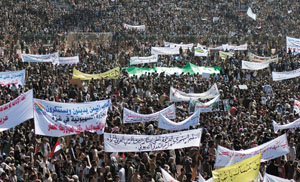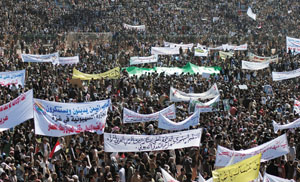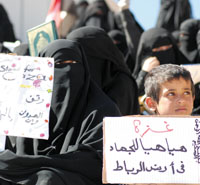
Tens of thousands of Yemenis protest in solidarity with the people of Gaza [Archives:2008/1220/Front Page]
December 29 2008
 |
 |
Photos by Amira Al-Sharif
SANA'A Dec. 28 ) The wave of anger that continues to sweep across the Arab and Muslim world was evident on the faces of the tens of thousands of Yemeni demonstrators that stood under the blazing sun in protest of the ongoing Israeli massacre of the Palestinians in Gaza which has so far killed almost 300 people and injured over 700.
A number of Arab leaders have denounced and condemned the Israeli attack, which started on Saturday, with President Ali Abdullah Saleh of Yemen among the first. Not only did he condemn the aggression, he also called for an urgent Arab Summit in effort to develop a unified stance against the siege and subsequent attacks.
Saleh discussed the matter with a number of his Arab leaders including the Qatari Emir Sheikh Hamad bin Khalifa Al Thani, and the President of Syria Bashar Al-Assad, Lebanese President Michel Sleiman, and President Omar Al-Beshir of Sudan.
Israel pounded the Gaza Strip with air raids following the decision by Israel to increase retaliation for cross-border rocket attacks against Israel, and the breakdown of a six-month-old Israel-Hamas truce, brokered in Egypt, earlier this month.
The ceasefire expired on December 19, with Hamas arguing that Israel had violated the truce by preventing vital food and medical supplies into the Strip.
Massacre in Gaza
According to medical resources in Gaza, the continuing Israeli bombardment of the impoverished Gaza Strip, has left no space left in the morgues and bodies were piled up in the emergency rooms and in the corridors, as many of the wounded screamed in pain.
More than 230 targets have been hit with missiles fired from helicopter gunships and fighter jets since Israel launched Operation Cast Lead on Saturday. Israeli Defense Minister, Ehud Brarak warned that the air raids could be followed by a major ground incursion into the Gaza Strip.
Reaction in Yemen
The demonstration in Yemen, which is so far the largest in the region and beyond, were backed by the ruling party, opposition groups and other organizations.
In Yemen, banners and slogans that read; “Where is humanity's conscience? and “We will not forget Gaza” amid photographs of past and present Palestinian leaders including Ismail Haniyeh, Sheikh Ahmed Yassin and Ismail Mughniyeh. In addition to photographs of women and children injured in the attacks.
The grief was evident in the eyes of the Palestinian women from Saleh Sakan Foundation, Takaful Foundation, and Palestine Female Youth Association, Al-Quds foundation. As they called for Al-Qassam Brigades, the armed wing of Hamas to take revenge and on Palestinian leaders to reply. They chanted, “Hamas is our base and the crowns on our heads”
Dr. Zienab, an Egyptian protester from Sana'a University dismissed the Egyptian stance and questioned the Arab, Islamic and the international communities' stance, “We are an Islamic nation and the Sharia of Islam should guide us,” she said.
Nada, a university student looking dazed asked, “What can we do?”
Yemen has called on the UN Security Council to intervene in order to prevent similar attacks in the future.
Palestinian reaction
In Damascus, top Hamas leader Khaled Meshaal called for a new Palestinian uprising, a third intifada, against Israel. He also said he was open to reconciliation with Abbas, but demanded that the Palestinian president cease negotiations with Israel.
“We will not leave our land, we will not raise white flags and we will not kneel except before God,” said Ismail Haniyeh.
Mahmoud Abbas, the Palestinian president and leader of the rival Fatah group, blamed the democratically- elected Hamas for the violence and traveled to Egypt to discuss the situation with his Egyptian counterpart Hosni Mubarak.
Hospitals, already suffering from shortages due to an 18-month blockade on the Gaza Strip, said they were struggling to cope with the number of injured, which included women and children. Director-general of ambulance and emergency service in Gaza Moaweya Hasanain said that hospitals of the Strip are suffering from a severe lack of medicines due to the Israeli siege on Gaza as they try to cope with this new catastrophe.
Reaction elsewhere
The presidents of Qatar, Yemen, Sudan, Lebanon, Syria, Jordan and Iran condemned the attacks.
The Arab League will not meet to discuss a common response to the Israeli massacre until a summit in Doha, Qatar scheduled to take place on January 2.
Foreign Ministers of Arab countries were also due to hold an emergency meeting on Sunday but the meeting was postponed until Wednesday.
Arab League secretary-general, Amr Moussa said the delay was because many ministers were busy in separate meetings of two Arab regional groups – the Gulf Co-operation Council (GCC) and the Maghreb Union.
A non-binding statement on behalf of the 15-member United Nations Security Council called for an “immediate halt to all violence” and on the parties involved in the conflict “to stop immediately all military activities”. The statement also called for a re-opening of border crossings to allow humanitarian supplies to reach Palestinians in Gaza.
The head of the GCC, which groups Washington's regional allies, on Saturday, described the Israeli attacks as “barbaric” and “ugly”, and Saudi Arabia urged the United States to intervene to end the strikes.
In Amman, 30 Jordanian lawmakers demanded the expulsion of the Israeli ambassador.
In London, protesters attacked the Israeli embassy.
Demonstrations also took place across Iraq and Egypt. In Egypt, protestors blamed their president, Hosni Mubarak, for not preventing the aggression.
The Hezbollah movement, which fought a 33-day war with Israel in 2006, has condemned the attacks as a “war crime and a genocide that requires immediate action from the international community and its institutions”.
European Union foreign policy Chief Javier Solana condemned Palestinian rocket attacks on southern Israel but also said that the Israeli airstrikes “are inflicting an unacceptable toll on Palestinian civilians.”
Leader of the 57-nation Organization of the Islamic Conference (OIC), Ekmeleddin Ihsanoglu, called the Israeli offensive a “war crime.”
A history of violations
Israel responded to Hamas' win in the elections with sanctions, and almost completely blockaded the impoverished coastal strip after Hamas seized power in 2007, although a 'lighter' siege had already existed before.
Human rights groups, both international and Israeli, slammed Israel's siege of Gaza, branding it “collective punishment.” A group of international lawyers and human rights activists had also accused Israel of committing “genocide” through its crippling blockade of the Strip.
Gaza remains under Israeli occupation as Israel controls air, sea and land access to the Strip. The Rafah crossing with Egypt, Gaza's sole border crossing that bypasses Israel, rarely opens as Egypt is under immense US and Israeli pressure to keep the crossing shut.
Fatah has little administrative say in the Israeli-occupied West Bank, and has no power in Arab east Jerusalem, both of which were illegally occupied by Israel in 1967. Israel also currently occupies the Lebanese Shebaa Farms and the Syrian Golan Heights.
——
[archive-e:1220-v:16-y:2008-d:2008-12-29-p:front]


